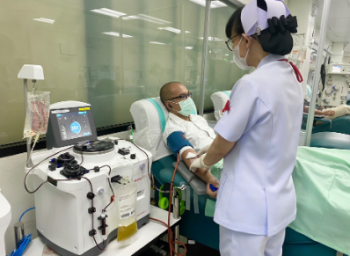
Plasma Donation (Single Donor Plasma)
-
1. Factor VIII Concentrate
Used for treating Hemophilia A (a genetic bleeding disorder).
-
2. IVIG (Intravenous Immune Globulin)
For autoimmune diseases, immunodeficiency disorders, and neurological conditions caused by immune dysfunction. -
3. Albumin
For chronic conditions that involve low albumin levels in the blood, such as kidney disease, diabetes, and organ failure in cancer patients. -
4. Serum for Hepatitis B Virus and Rabies Antiserum
Eligibility for Plasma Donation:

-
 Age: 17 to 60 years (first-time platelet donors must be under 50 and have donated whole blood at least once in the past year).
Age: 17 to 60 years (first-time platelet donors must be under 50 and have donated whole blood at least once in the past year). -
 Weight: Minimum of 50 kg.
Weight: Minimum of 50 kg. -
 Vein Visibility: Clear veins in the arm at the elbow.
Vein Visibility: Clear veins in the arm at the elbow. -
 Diet: Avoid high-fat foods before donating, such as pork knuckle rice and chicken rice.
Diet: Avoid high-fat foods before donating, such as pork knuckle rice and chicken rice. -
 Health: Must be in good health with no disqualifying medical conditions.
Health: Must be in good health with no disqualifying medical conditions. -
 For those participating in the plasma donation program for hepatitis B and rabies serum:
For those participating in the plasma donation program for hepatitis B and rabies serum:
- In the hepatitis B serum program, staff will collect approximately 6 mL of blood to test for Anti-HBsAg. If the result is positive (≥ 5 IU/mL), the donor will be enrolled in the hepatitis B immunoglobulin (HBIG) program and scheduled for monthly injections for 3 months. Blood will be tested for Anti-HBsAg levels before the second and third injections. After completing all three injections, plasma donation can begin, with donations every 14 days. While in the plasma donation program, booster shots are required every 3 months, along with Anti-HBsAg testing.
- For the rabies serum program (Human Rabies Immunoglobulin, HRIG), the VERORAB vaccine will be administered: 0.2 mL ID divided into two 0.1 mL intramuscular injections in the deltoid muscles of both arms. The vaccination schedule is as follows:
- After completing all three vaccinations, donors can start plasma donation 2 weeks later, with donations every 14 days. Booster shots will be required every 3 months during the program.
- For plasma donations from donors who do not require vaccination, similar selection criteria apply without the need for vaccinations.

Additional Care for Plasma Donors
Plasma donors should have their Total Protein and Albumin levels monitored every 6 months. If the protein level falls below 6.0 g/dl, the donor should temporarily halt donations and arrange for a follow-up test in one month. If the level is above 6.0 g/dl, the donor may continue donating.

Plasma Donation Process
Plasma donation is performed using an automated blood component separator (Blood Cell Separator). The donation takes approximately 45 minutes, with each session collecting around 500 cc. Donors can give plasma every 14 days.
Operating Days and Hours
08:30 AM – 04:30 PM
(Last platelet donations accepted at 03:30 PM)
07:30 AM – 07:30 PM
(Last platelet donations accepted at 06:00 PM)
08:30 AM – 12:30 PM
(Last platelet donations accepted at 12:00 PM)
For platelet donation appointments or further inquiries, please call 02-263-9600 -99, extensions 1143 or 1144.
Operating Days and Hours for the Plasma Donation Room, 2nd Floor
08:30 AM – 04:30 PM
Closed on Saturday, Sunday, and Public Holidays
For more details, please call 0 2256 4300 or 0 2263 9600-99, extensions 1101 or 1203.

 English
English